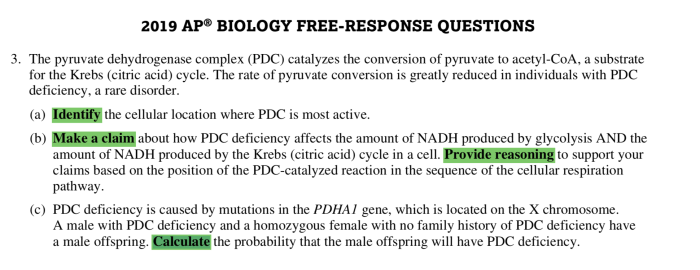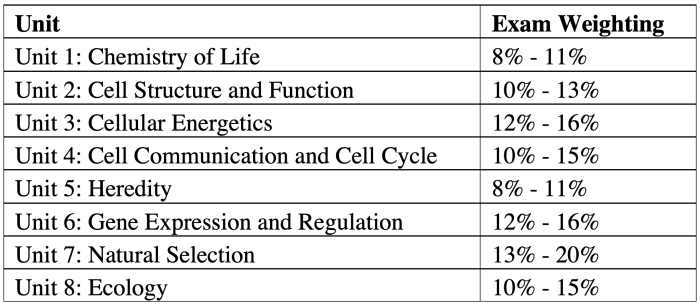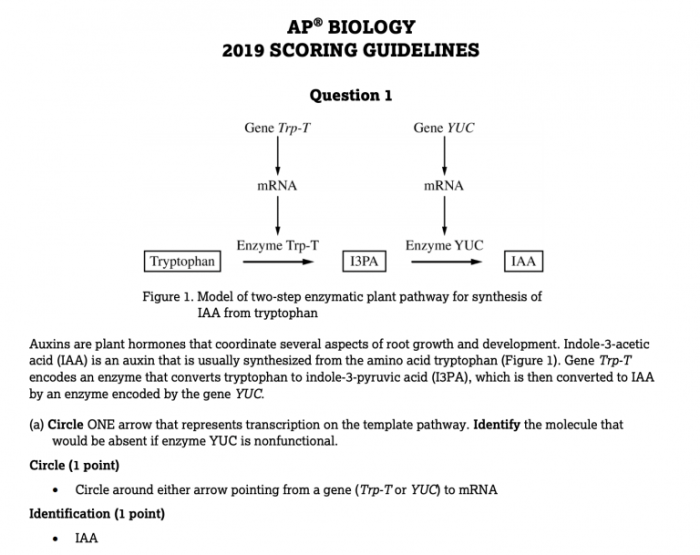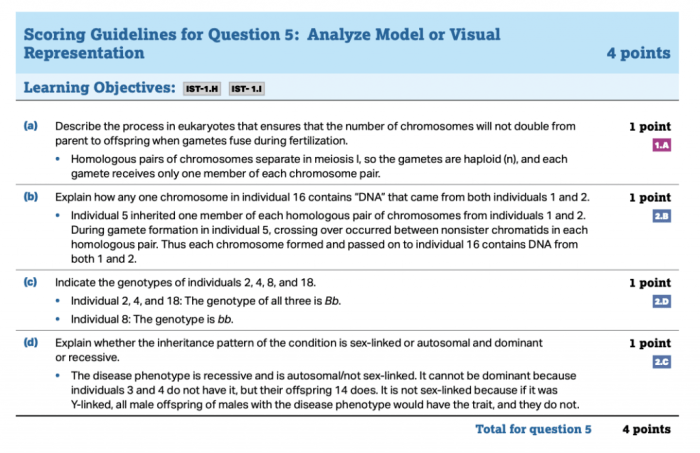Ap bio 2013 frq answers – Embark on an exploration of the 2013 AP Biology Free Response Questions (FRQs), delving into the depths of their intricate concepts and equipping you with the knowledge to conquer the exam.
This comprehensive guide unveils the secrets of the FRQs, providing a detailed analysis of each question, identifying key skills and concepts tested, and examining the strengths and weaknesses of student responses.
AP Biology 2013 FRQ Answer Analysis

The 2013 AP Biology FRQ questions assessed students’ understanding of a wide range of topics, including cellular processes, genetics, evolution, and ecology. The questions required students to apply their knowledge to novel situations and to demonstrate their ability to analyze data, draw conclusions, and communicate their ideas effectively.
The following is a detailed summary of the questions and a discussion of the key concepts and skills tested in each question:
Question 1: Cellular Processes
This question required students to analyze data on the effects of different environmental conditions on the rate of photosynthesis in a plant. Students were asked to identify the independent and dependent variables in the experiment, to describe the relationship between the two variables, and to explain the underlying physiological mechanisms responsible for the observed results.
Key Concepts and Skills Tested:
The AP Bio 2013 FRQ answers have been a hot topic lately. For a fun break, why not check out the witty Puss in Boots 2 quotes ? They’ll surely make you smile. After your break, you can return to the AP Bio 2013 FRQ answers feeling refreshed and ready to conquer them.
- Photosynthesis
- Experimental design
- Data analysis
- Scientific reasoning
Strengths and Weaknesses of Student Responses:
- Many students were able to correctly identify the independent and dependent variables in the experiment.
- However, some students struggled to describe the relationship between the two variables and to explain the underlying physiological mechanisms responsible for the observed results.
Question 2: Genetics
This question required students to analyze a pedigree and to determine the mode of inheritance of a particular trait. Students were asked to identify the genotype of each individual in the pedigree, to explain the inheritance pattern of the trait, and to predict the probability of a child inheriting the trait.
Key Concepts and Skills Tested:
- Pedigree analysis
- Modes of inheritance
- Probability
Strengths and Weaknesses of Student Responses:
- Many students were able to correctly identify the genotype of each individual in the pedigree and to explain the inheritance pattern of the trait.
- However, some students struggled to predict the probability of a child inheriting the trait.
Question 3: Evolution
This question required students to analyze data on the distribution of a particular species of bird on an island. Students were asked to explain how the distribution of the bird could be explained by the theory of evolution, to identify the selective pressures that may have driven the evolution of the bird, and to predict how the distribution of the bird might change in the future.
Key Concepts and Skills Tested:
- Theory of evolution
- Natural selection
- Population genetics
Strengths and Weaknesses of Student Responses:
- Many students were able to correctly explain how the distribution of the bird could be explained by the theory of evolution.
- However, some students struggled to identify the selective pressures that may have driven the evolution of the bird and to predict how the distribution of the bird might change in the future.
Question 4: Ecology
This question required students to analyze data on the population dynamics of a particular species of deer. Students were asked to identify the carrying capacity of the environment for the deer, to explain how the population size of the deer is regulated, and to predict how the population size of the deer might change in the future.
Key Concepts and Skills Tested:
- Population ecology
- Carrying capacity
- Population regulation
Strengths and Weaknesses of Student Responses:
- Many students were able to correctly identify the carrying capacity of the environment for the deer and to explain how the population size of the deer is regulated.
- However, some students struggled to predict how the population size of the deer might change in the future.
Comparing Student Responses to AP Biology FRQs

By comparing the responses of high-scoring and low-scoring students on the 2013 AP Biology FRQs, we can identify the key differences in their approaches to the exam and gain insights into effective teaching and learning strategies.
Use of Evidence
- High-scoring students:Cite specific evidence from the passage or their own knowledge to support their claims. They provide detailed explanations and examples.
- Low-scoring students:May make general statements without providing specific evidence. They often rely on vague or incomplete information.
Organization
- High-scoring students:Structure their responses logically, using clear transitions and headings. They present information in a coherent and easy-to-follow manner.
- Low-scoring students:May struggle to organize their thoughts and present information in a cohesive way. Their responses may be disjointed and difficult to understand.
Clarity
- High-scoring students:Use precise language and clear explanations. They define technical terms and avoid jargon. Their writing is concise and easy to read.
- Low-scoring students:May use ambiguous language or technical terms without defining them. Their writing may be unclear or confusing.
Implications for Teaching and Learning
These differences highlight the importance of:
- Emphasizing the use of evidence:Students need to be taught how to find, analyze, and use evidence to support their claims.
- Providing clear organization:Teachers should help students develop effective strategies for organizing their thoughts and presenting information in a logical way.
- Encouraging clarity:Students need to be encouraged to use precise language, define technical terms, and avoid jargon.
Using AP Biology FRQs to Improve

AP Biology FRQs serve as invaluable tools for educators to identify areas where students need additional support and to develop engaging and effective lesson plans.
Identifying Areas for Improvement
- Analyzing student responses to the FRQs can reveal specific knowledge gaps and misconceptions.
- For instance, the 2013 FRQ on gene regulation exposed common misunderstandings about the role of transcription factors.
Developing Engaging Lesson Plans
- FRQs can inspire hands-on activities that reinforce key concepts.
- The FRQ on photosynthesis could lead to a lab where students design experiments to investigate the impact of light intensity on photosynthetic rate.
Additionally, FRQs can be used to:
- Assess student understanding of complex biological processes.
- Prepare students for the AP exam by exposing them to authentic assessment tasks.
- Promote critical thinking and problem-solving skills.
Preparing Students for AP Biology FRQs

Preparing students for the AP Biology Free Response Questions (FRQs) requires a multifaceted approach that emphasizes skill development, content mastery, and strategic thinking. By employing effective strategies and providing ample resources, educators can empower students to succeed on this challenging portion of the exam.
Developing Essential Skills
To excel on the FRQs, students must develop a range of cognitive and analytical skills, including:
- Scientific Inquiry:Formulating hypotheses, designing experiments, and interpreting data.
- Problem-Solving:Analyzing complex scenarios and applying scientific principles to solve problems.
- Critical Thinking:Evaluating evidence, identifying biases, and drawing logical conclusions.
li> Communication:Articulating scientific concepts and ideas clearly and concisely.
Mastering Content Knowledge
A thorough understanding of AP Biology content is crucial for success on the FRQs. Students should focus on:
- Core Concepts:Covering all major topics in the curriculum, including cell biology, genetics, evolution, and ecology.
- Interconnections:Recognizing the relationships between different biological concepts and how they contribute to a holistic understanding.
- Experimental Design:Understanding the principles of experimental design and how to apply them to real-world scenarios.
Effective Strategies
Several effective strategies can be employed to prepare students for the FRQs:
- Practice and Analysis:Provide students with opportunities to practice answering FRQs and analyze sample responses to identify areas for improvement.
- Timed Writing:Train students to write under timed conditions to simulate the exam environment.
- Peer Review:Encourage students to critique each other’s responses to foster critical thinking and improve communication skills.
- Concept Mapping:Utilize concept maps to help students visualize and organize complex biological concepts.
Resources for Preparation, Ap bio 2013 frq answers
Numerous resources are available to support students in their preparation for the AP Biology FRQs:
- College Board:Provides practice FRQs, sample responses, and scoring guidelines on their website.
- Textbooks and Review Books:Offer practice questions, concept summaries, and additional resources.
- Online Platforms:Websites and apps provide interactive simulations, practice tests, and video tutorials.
- Supplemental Materials:Access to scientific journals, documentaries, and online databases can enrich students’ understanding.
FAQ Insights: Ap Bio 2013 Frq Answers
What is the significance of the 2013 AP Biology FRQs?
The 2013 FRQs provide valuable insights into the exam’s content and structure, helping students identify areas for improvement and develop effective study strategies.
How can I use the FRQs to improve my AP Biology performance?
By analyzing the FRQs, you can pinpoint specific areas where you need additional support. Use this information to focus your studies and develop targeted practice.
What are some effective strategies for preparing for the AP Biology FRQs?
Effective strategies include practicing time management, understanding the question prompts, organizing your thoughts clearly, and providing evidence to support your claims.